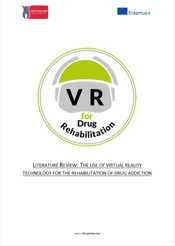Library
VR for Drug Rehabilitation Reports
Reports & Books
- Manual de Adicciones para Psicólogos Especialistas en Psicología Clínica en Formación (Iglesias et al., 2011)
- Drug treatment and harm reduction in prisons (Stöver & Kastelic, 2014) Chapter of WHO Report “Prisons and Health”
- Health in prisons. A WHO guide to the essentials in prison health (Stöver, Jürgens, Gatherer & Nikogosian, 2007) This publication makes recommendation to improve prisoners’ mental health given that the initial period into a prison can be traumatic and exacerbate emotional instability and/or mental health issues. Among the multiple recommendation are: clear procedures during the induction period to reduce mental distress and reception staff training to identify warning signs of distress and mental health problems; an environment that sends a message of positive expectations and respect and promoting anti-bullying and anti-mobbing.
Articles & Other publications
- Virtual Reality Clinical Research: Promises and Challenges (Garrett, et al., 2018)
- Substance abuse and dependence in prisoners: a systematic review (Fazel, Bains, & Doll, 2006)
- The Past, Present, and Future of Virtual and Augmented Reality Research: A Network and Cluster Analysis of the Literature (Cipresso, Giglioli, Raya, & Riva, 2018)
- Immersive virtual environments in cue exposure (Kuntze et al., 2001)
- Return to drug use and overdose after release from prison: A qualitative study of risk and protective factors (Binswanger et al., 2012)
- Cue-exposure therapy to decrease alcohol craving in virtual environment (Lee, Kwon, Choi, & Yang, 2007)
- Assessing reactivity to virtual reality alcohol based cues (Bordnick, et al, 2008)
- Using virtual reality to investigate complex and contextual cue reactivity in nicotine dependent problem drinkers (Traylor, Parrish, Copp, & Bordnick, 2011)



